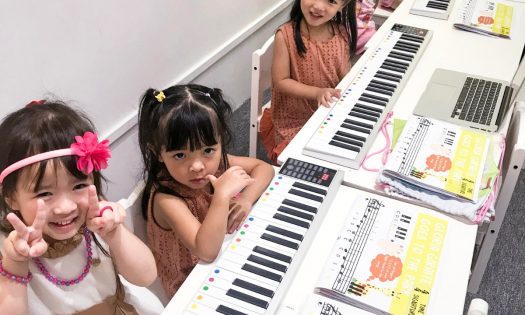
What are some challenges that young piano beginners might face and how can they overcome these challenges?
As Asad Meah once said, “Challenges come to us to make us better, not bitter.” Challenges are inevitable in any endeavour. Learning the piano for the first time can be difficult at any age, but young children might face more barriers at the start. Some of these barriers include difficulty coordinating the two hands, catching the right rhythm, or a lack of motivation to consistently practice. The focus is not on avoiding these challenges but on how best to pivot around these barriers and help your child persist even when the going gets tough.
Deciphering a piece
At the initial stages of learning the piano, young beginners might find sight-reading a little challenging. This is because young beginners are still in the process of learning the rules that govern the language of music (i.e. music theory). Therefore, when young beginners approach a musical score for the first time, the score might seem like a splatter of notes, symbols, and words. Everything looks alien. However, with time and consistent practice, young beginners will be trained to tease out common note patterns, trace connections between different components in the piece, and be familiar with the rhythm and dynamics markings.
Here at JoyWaltzAcademy, we take a step-based approach to assisting our young beginners in acquiring a solid understanding of music theory. Our customised Pianist Prodigy books contain concepts that are organised into smaller digestible segments and reinforced through a range of fun drills and exercises such as colouring, tracing, and matching images to words.
Juggling multiple things at once

This infographic by Encore music lessons exemplifies the degree of multitasking that is involved when playing the piano. A student focuses on finger patterns, finger position, notes, rhythm, tempo, pitch, melody, and harmony all at the same time. Set against this context, playing the piano may seem daunting and even overwhelming to some young beginners.
The most intuitive solution for this is to focus on one thing at a time. This means practising a small group of notes repeatedly until you cannot get it wrong. Or it could mean warming up with separate hands before playing with both hands. Deconstruct finger drills, song pieces, or even music theory concepts into smaller manageable sections and master those sections first before weaving multiple sections together. This gives students a guide of where to channel their attention and energy while conferring a sense of mastery. Celebrate and appreciate the small victories!
Committing to practice sessions
While practising is critical at all stages of learning piano, finding the time and motivation to practise might not come easy, and the latter usually influences the former. After all, if you have the will to practise the piano, you will make time for it. Here are some tips on sparking that drive to practise:
Firstly, practise with purpose. Focusing on a small goal gives a direction to work towards. It can range from ensuring proper hand position throughout practice to maintaining good posture to mastering a small section without any mistakes.
Second, set aside 10-15 minutes of practice time on 4-5 days a week. One suggestion would be to weave piano practice time right before or after meals so that piano practice is seen as an interim activity instead of an assignment.
Thirdly, vary the practice content. Allowing your child to play a few tunes of the songs that they like injects novelty, making practising the piano fun and exciting. Alternatively, a simple duet may also help pique interest and expose them to the possibilities of the piano.
To learn more on how you can motivate your child to practise, read tips to motivate your child to practise the piano.
Conclusion
The journey of learning the piano might not always be easy, but it will be a highly fulfilling one. The above are some strategies to aid your child in overcoming various challenges he/she might face in their piano learning journey. After all, no obstacle is insurmountable when equipped with a positive mindset and effective strategies.